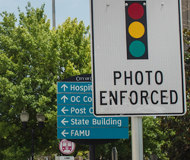Article from: www.thenewspaper.com/news/64/6485.asp
6/12/2018
Florida Court: No Refund For Illegal Red Light Tickets
Florida Court of Appeal denies relief for motorists who paid illegally issued red light camera tickets in Orlando.
 Florida vehicle owners who paid illegally issued red light camera tickets will not be receiving a refund from the city of Orlando. The state Court of Appeal ruled on Friday that when people pay a citation, they are doing so voluntarily and are not entitled to their money back.
Florida vehicle owners who paid illegally issued red light camera tickets will not be receiving a refund from the city of Orlando. The state Court of Appeal ruled on Friday that when people pay a citation, they are doing so voluntarily and are not entitled to their money back.
In 2014, the Florida Supreme Court ruled that Orlando and other cities violated state law when they allowed private, for-profit companies to run red light camera programs without the sanction of the legislature (view ruling). The decision put a significant amount of money at risk statewide. In Orlando, American Traffic Solutions (ATS) issued 49,423 tickets worth $7.8 million before permission was given in 2010. Only 378 appealed, and 13,572 ignored the ticket. The rest, 35,851, dropped a check in the mail or paid online.
"There was no longer an issue as to whether the city had improperly imposed fines against potential class members," Judge Kerry I. Evander wrote for the court. "It had. The primary issue became whether the city was required to refund monies paid, notwithstanding the fact that fines had been improperly imposed in the first place."
Motorist Richard Easter filed suit in an attempt to force the city to pay back the millions it collected because the program essentially operated as an illegal tax. When taxes are overpaid, refunds are due. The three-judge appellate panel pointed to the state Supreme Court precedent to say this argument did not apply.
"The voluntary payment defense has existed in Florida for over a century," Judge Evander wrote for the three-judge panel.
Orlando cited the doctrine as a way to have the class action thrown out. The court agreed, pointing out that Easter did not pay the fine voluntarily, which meant there could not be a class action because nobody else did what he did.
"Easter made significant efforts to contest his fine, prior to eventually making payment under protest," Judge Evander wrote for the three-judge panel. "By contrast, most of the proposed class members simply paid the fine. The Florida Supreme Court has observed that the determination of whether a party has shown actual compulsion or coercion sufficient to overcome the voluntary payment defense normally requires an individualized, fact-intensive inquiry."
A copy of the ruling is available in a 250k PDF file at the source link below.
Source: Easter v. Orlando (Court of Appeal, State of Florida, 6/8/2018)
Permanent Link for this item
Return to Front Page
 Florida vehicle owners who paid illegally issued red light camera tickets will not be receiving a refund from the city of Orlando. The state Court of Appeal ruled on Friday that when people pay a citation, they are doing so voluntarily and are not entitled to their money back.
Florida vehicle owners who paid illegally issued red light camera tickets will not be receiving a refund from the city of Orlando. The state Court of Appeal ruled on Friday that when people pay a citation, they are doing so voluntarily and are not entitled to their money back.